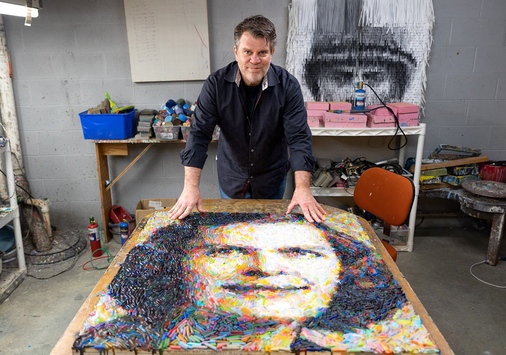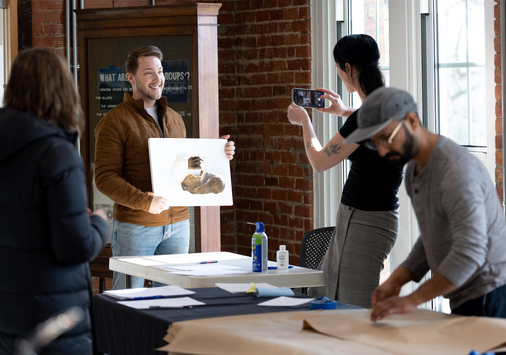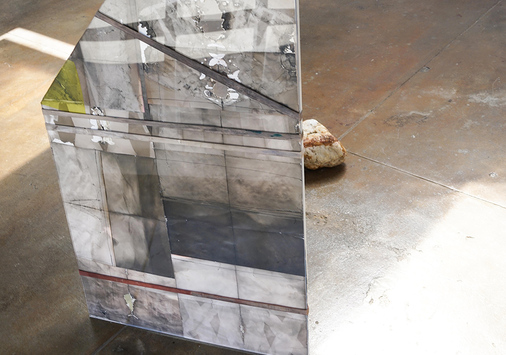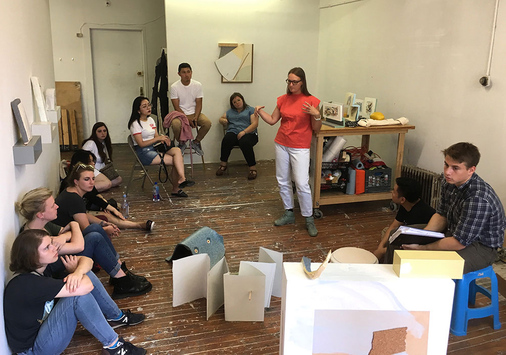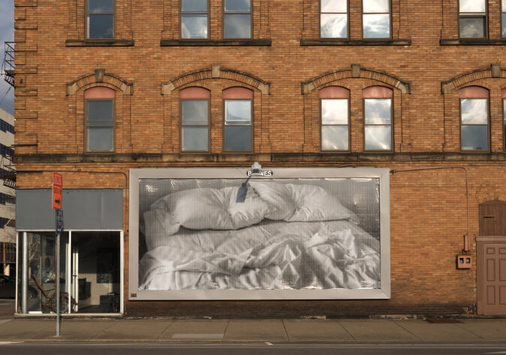
Describe the process you went through while selecting your graduate school and career pathway: what impacted your decision?
After Denison University, I worked for Akron Art Museum and a historical home museum. After a few years of learning the many roles in a museum career path, I researched arts administration and museum studies graduate degrees. However, my passion was painting, which I continued during my free time after Denison. I decided to look into schools that have a liberal approach for research topics and schools that may possibly feed both interests, learning more about contemporary painting and museum studies. I spoke with many professors about my interests and read program’s academic curriculum. Ultimately, I chose a few schools based on the mentors I would work with and their research interests, and I am very glad that I did. I chose Oregon College of Art and Craft because of its mentor-based learning, traditional craft expertise, small classes and campus, thriving arts scene location, and a graduate assistantship opportunity. I do regret not looking for more funded programs, but also chose my program based on scholarships. I am very happy with my decision, as I was able to tailor my masters degree to my interests, have many off-site field excursions to contemporary art institutes, and have a full bodied painting studio and research project, while working in a gallery and for the college’s marketing and development.
What challenges did you face on the way to or during graduate school, and how did you overcome them?
Financial challenges were imminent, I had to pick up odd jobs and even take a semester off to assist with the financial difficulties. I am not sure if I would move to a more expensive city for graduate school, many friends did better in less urban school settings. The odd jobs got in the way of many extra curricular opportunities, such as networking outings and gallery openings. I had to balance both and completely put my program first, leaving my family and often relying on my partner for household responsibilities. I am in a lot of debt with over half of my tuition covered in scholarships. For an art degree, emotional and psychological changes also took place when work was heavily critiqued. The work evolved very quickly. It was a very stressful two years, but my motivation was very independent, while some students took time off to relax, I used the two years to really push myself and do not regret that. Professional challenges also happened, I had to learn how to speak publicly, introduce myself to a room full of strangers, talk about my artwork in front of a large lecture hall, learn how to teach in a current academic climate.
What was your favorite part of your graduate school experience?
Because I really researched my mentor and professors, I really enjoyed my education, working with my professors, and establishing a long term relationship with them. I enjoyed our projects and off site trips, everything that was optional I participated in that and I have no regrets. I enjoyed getting out of my comfort zone and acquainting myself in a new arts community and city-I wish that I could stay in such a city long term, definitely think about making connections in a place you want to live long term. I enjoyed my cohort and established long term relationships with fellow students. I met amazing people from all over the world and now consider them family. I was pushed and motivated to create more work than I ever thought possible. I was able to develop critical inquiry and language around a subject that I will enjoy for the rest of my life. I enjoyed teaching and residency opportunities.
What are your professional plans post-graduation?
Post-graduation for fine arts graduates is very challenging and difficult. We often are not given a position right out of school and have to apply to even more difficult post-graduate programs right after the most intense few years of our lives. I have enjoyed showing my thesis body of work in multiple national galleries and opportunities for scholarship-funded workshops in Colorado and Ohio. I am working on moving across the country for my partner’s business, establishing a new studio, applying to shows, creating more work and applying for art positions. Currently, I work at a non-art related professional job that will cover studio expenses, debt, and allow me to save money for long term residency next year. I just graduated six months ago. I am also planning a long term business plan for starting up my own contemporary art-related business.
What advice would you give a current Denison student considering a graduate program like yours?
An MFA is a truly incredible experience for yourself, your art and your arts community. It is important to utilize every opportunity to the fullest extent, and know that there is no external reward for your incredible achievements in the art world for a very very long time. Once you graduate, the rewards are purely internal. You may realize that teaching is incredibly exhausting and you only want to practice art. You may realize that your practice changed completely altogether, and may be even outside traditional art media. In order to be a full time artist, you must sacrifice a lot of comfort. If you think you will make money or grab a comfortable position after art school, this is not the degree for you at all. This is a huge long term financial sacrifice. If you want to commit yourself to your artwork, to becoming a better artist, individual, community member, if you enjoy not only contemporary art, but philosophy, history, museum studies, pedagogical studies, research, reading and writing, this is a once in a lifetime opportunity.

